
Behind every successful event is a team of vendors working in sync; caterers, decorators, AV crews, security, and more. They set the ambiance, manage key operations, and help create the experience your attendees will remember. But when coordination is poor, even the best plans can fall apart.
That’s why proactive vendor management is key. From sourcing and setup to breakdown, every vendor should align with your goals and timelines. Checklists help, but what you really need are systems that keep everyone connected and accountable.
In this EventsAir guide, we’ll show you how to choose the right vendors, stay organized, and deliver smooth, engaging events from start to finish.
Who are event vendors?
Event vendors are third-party suppliers that help bring your event to life. They provide the services and resources needed to make everything run smoothly before, during, and after the event.
Common vendor categories include:
- Catering and beverages
- AV and technical support
- Venue services
- Event rentals (e.g., furniture, lighting)
- Entertainment
- Security
- Transportation
- Decor and floral arrangements
Each vendor has different deliverables, timelines, and requirements, which can quickly become overwhelming if you’re managing everything across scattered emails, spreadsheets, and calls.
That’s where a centralized platform like EventsAir helps. You can assign tasks, set deadlines, and share real-time updates with every vendor, so nothing gets missed.
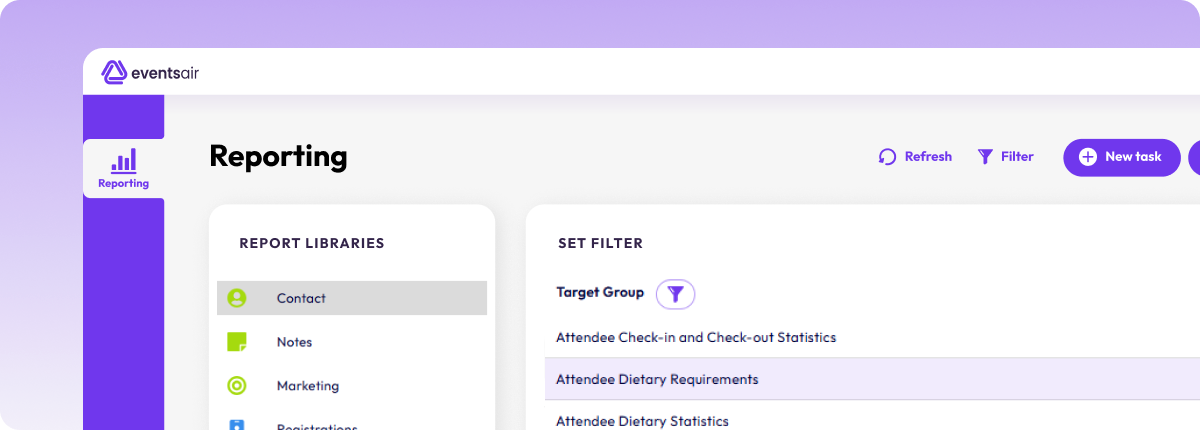
Why vendor management matters
- Ensures smooth event execution: From setup to teardown, well-managed vendors keep your event on schedule and prevent costly delays.
- Keeps quality consistent: Clear expectations help vendors deliver services that match your standards.
- Protects your budget: Avoid scope creep and unexpected fees with transparent contracts, approvals, and milestone tracking.
- Improves attendee experience: When vendors deliver smoothly, everything from catering to AV works as it should, keeping your audience engaged and satisfied.
- Makes future events easier: With performance data and post-event insights, you’ll know which vendors to trust and where to improve next time.
How to find the right event vendors
1. Define your scope and requirements
Before reaching out to vendors, make a list of everything your event needs:
- Services required (e.g., catering, AV, translation)
- Budget for each service category
- Key dates and delivery timelines
- Venue-specific restrictions (e.g., union labor rules, power access)
All-in-one event management platforms like EventsAir offer pre-event planning tools that make this step easier. You can manage tasks, track budgets, and monitor procurement timelines, all from a single dashboard.
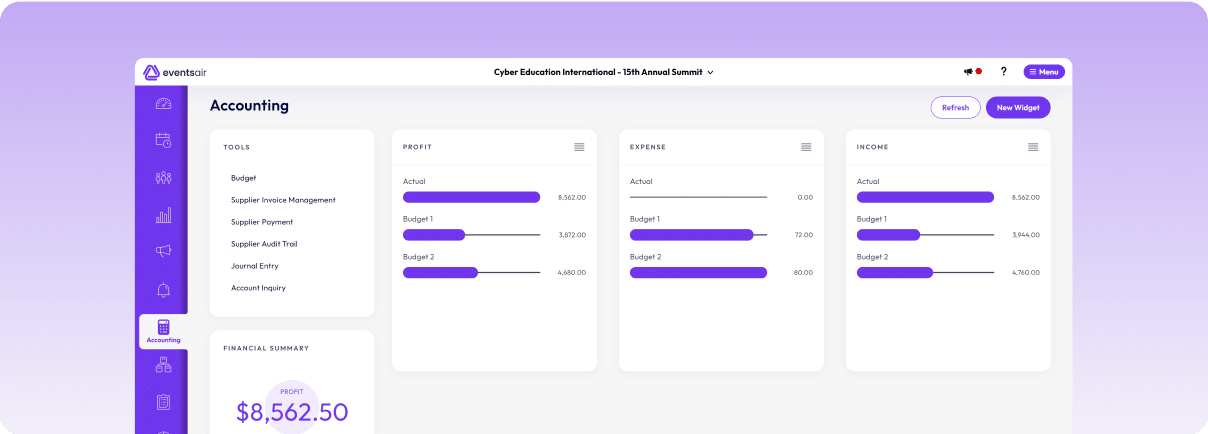
2. Leverage online platforms and directories
Finding the right vendor is now easier, thanks to online directories and digital platforms. You can quickly search, compare, and shortlist vendors across categories from catering to AV to translation services.
Use clear criteria to evaluate each vendor, such as:
- Licensing, insurance, and compliance
- Portfolio of similar past events
- Responsiveness and communication style
- Willingness to do a trial run or site visit
When browsing directories:
- Focus on recent reviews and real customer feedback
- Double-check for insurance and up-to-date certifications
- Look for examples that match your event’s scale and style
- Compare pricing across multiple vendors
With EventsAir, you can also store vendor contacts and profiles directly in your dashboard for easy access later.
3. Get multiple quotes and compare
Always request at least three quotes for each vendor category. While price matters, it shouldn’t be the only factor. Consider the full picture, including reliability, flexibility, and support.
Create a comparison matrix that includes:
- Total cost
- Scope of work
- Setup and takedown times
- Any extra fees or overtime charges
You can use EventsAir’s budget tracking features to keep all quote comparisons in one place. This makes it easy to compare options side by side and choose the vendor that fits your event needs, without going over budget.
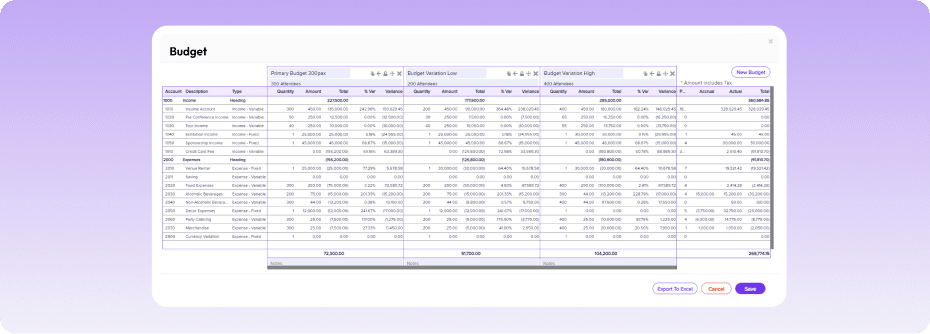
4. Interview and negotiate
Once you’ve narrowed down your top vendor choices, take time to vet them beyond the quote. Organize short, focused interviews to help you confirm their fit, clarify expectations, and set the tone for a successful partnership.
Start with a quick 15–30 minute call to:
- Assess how well they understand your event needs
- Gauge their responsiveness and communication style
- Confirm availability and interest
Use the conversation to clarify key details, such as:
- Scope of work
- Setup and delivery timelines
- Payment terms and cancellation policies
- On-site responsibilities and main point of contact
When it’s time to negotiate:
- Ask about discounts for bundled services or repeat events
- Explore off-peak pricing or multi-event deals
- Be transparent about your event budget; many vendors are open to flexible terms
The goal is to build a clear, collaborative relationship from the start, so you avoid surprises and keep everything running smoothly on event day.
How to manage event vendors effectively
1. Establish clear contracts and expectations
Successful vendor relationships start with a solid agreement. Having clear contracts protects both sides and reduces the risk of last-minute surprises.
Every vendor agreement should include:
- Scope of work: Spell out exactly what the vendor will provide: services, products, quantities, and quality standards. Be specific to avoid misunderstandings later on.
- Timelines & milestones: Define key deadlines for setup, delivery, and completion. Always build in some buffer time for unexpected changes.
- Payment terms: Outline payment amounts, schedules, and accepted methods. Include terms for late fees, cancellations, and change requests.
- Performance standards: Set expectations for service quality, response times, and accountability. Define what happens if standards aren’t met.
- Cancellation & contingencies: Include terms for cancellations, refunds, and force majeure events. Flexible policies can save your event if plans shift unexpectedly.
2. Create a centralized communication system
When managing multiple vendors, you need to ensure everyone is on the same page. Without a clear communication process, you may miss important details, leading to delays.
Here’s how to keep communication organized and effective:
- Have a single point of contact: Assign one team member as the primary liaison for all vendors. This keeps messaging consistent and ensures decisions flow through the right channels.
- Regular check-ins: Schedule weekly or bi-weekly calls with your top vendors in the lead-up to your event. Use these meetings to track progress, flag issues, and confirm logistics.
- Shared documentation: Keep event details like layouts, timelines, and contact lists in one place where vendors can easily access the latest updates.
- Change management: Create a simple process for handling last-minute changes. Always document adjustments to scope, budget, or timing and confirm them in writing before moving forward.
3. Implement timeline and budget tracking
Staying on schedule and within budget is one of the biggest challenges in vendor management. Delays or overspending in one area can quickly affect the entire event.
Here are some timeline management tips:
- Start with a master timeline that outlines every vendor’s deliverables and dependencies.
- Identify critical path activities, those that, if delayed, will push the whole event timeline back.
- Build in contingency time for high-risk tasks like venue setup or AV installation.
- Monitor progress through weekly check-ins and adjust timelines as needed to stay on track.
To control your budget:
- Track actual spending against your approved budgets in real time.
- Set thresholds that require approval before any additional spend is committed.
- Watch out for scope creep, small changes that pile up and inflate costs.
- Maintain a buffer fund to cover any unexpected expenses without affecting the overall event quality.
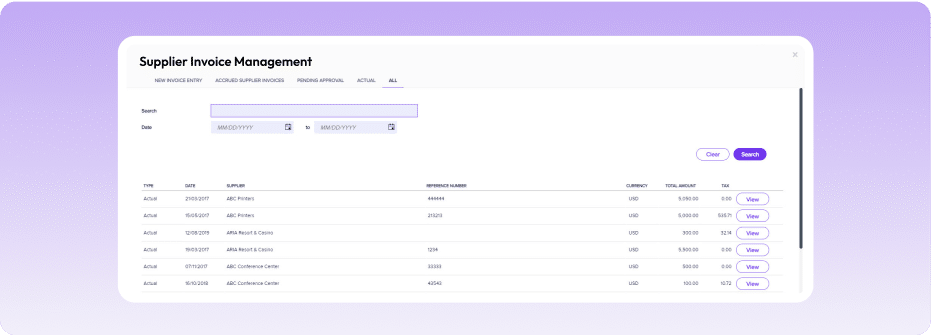
Use project management tools that integrate with your event management platform for seamless tracking. Fortunately, EventsAir’s budget management features provide detailed ROI analysis for budget tracking.
4. Coordinate load-in and setup logistics
Event setup is one of the most time-sensitive phases of execution. With multiple vendors arriving onsite, often with overlapping needs, coordination is important. Without a clear plan, delays, safety risks, and miscommunication can quickly affect the timeline.
Smart load-in coordination starts with:
- Detailed floor plans: Share accurate maps that highlight loading zones, vendor areas, booth placements, and equipment routes.
- Sequenced scheduling: Plan vendor setup in phases. Heavy equipment and staging should go in first, followed by decor, AV tech, and other lighter elements.
- On-site supervision: Designate experienced staff to manage setup on the ground. Having decision-makers on-site keeps things moving by resolving conflicts and approving changes quickly.
- Safety protocols: Provide clear safety guidelines, verify vendor insurance, and brief teams on emergency procedures before load-in begins.
- Real-time communication: Set up a shared communication channel (e.g., messaging app or walkie-talkie group) so your event management team can coordinate logistics, flag issues, and adapt to changes as they happen.
5. Monitor performance and gather feedback
Vendor management doesn’t end when your event wraps. To improve future outcomes, review vendor performance and collect feedback that helps strengthen relationships and drive better results next time.
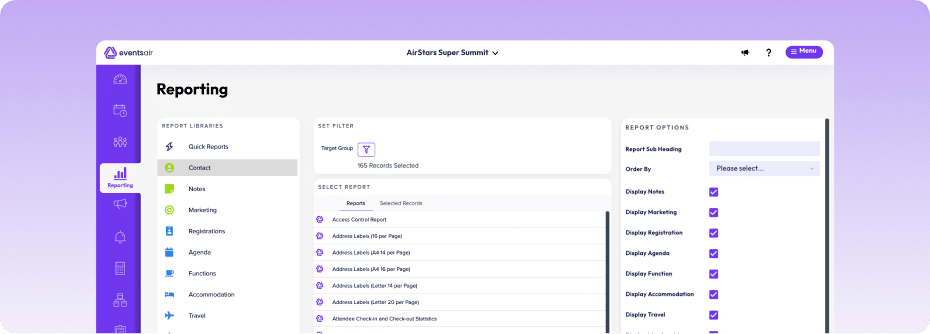
Track vendor performance through:
- Attendee feedback: Post-event surveys can uncover issues that may not have been visible to your team. Was the food on time? Was the tech seamless? Attendees often notice the details.
- Vendor debriefs: Set up a short review session with key vendors after the event. Discuss what went well, what could be improved, and how to streamline collaboration moving forward.
- Performance records: Log each vendor’s performance: timelines, communication, responsiveness, and issue resolution. This creates a reliable reference for future events.
EventsAir’s analytics and reporting features help you track vendor performance metrics and compile comprehensive post-event analysis.
Streamline vendor management with EventsAir
Finding and managing the right vendors can make or break your event. From setup delays to miscommunication on event day, even small gaps can create big problems. But with the right systems in place, vendor management doesn’t have to be stressful.
EventsAir gives you full control over vendor coordination, all in one place. From coordinating load-in sequences and equipment timing to tracking performance and resolving issues in real time, our platform helps you stay organized, informed, and ahead of schedule.
Ready to simplify vendor management and deliver smoother events? Book a Demo with EventsAir today.
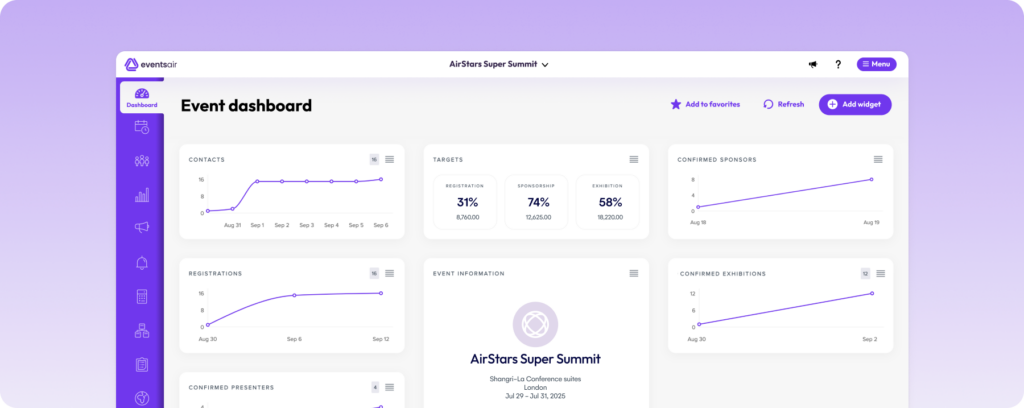
Event Planning & Management | Sponsors & Exhibitors
See EventsAir in action
Discover why 12,000+ event professionals trust EventsAir to deliver effortless events, every time.




